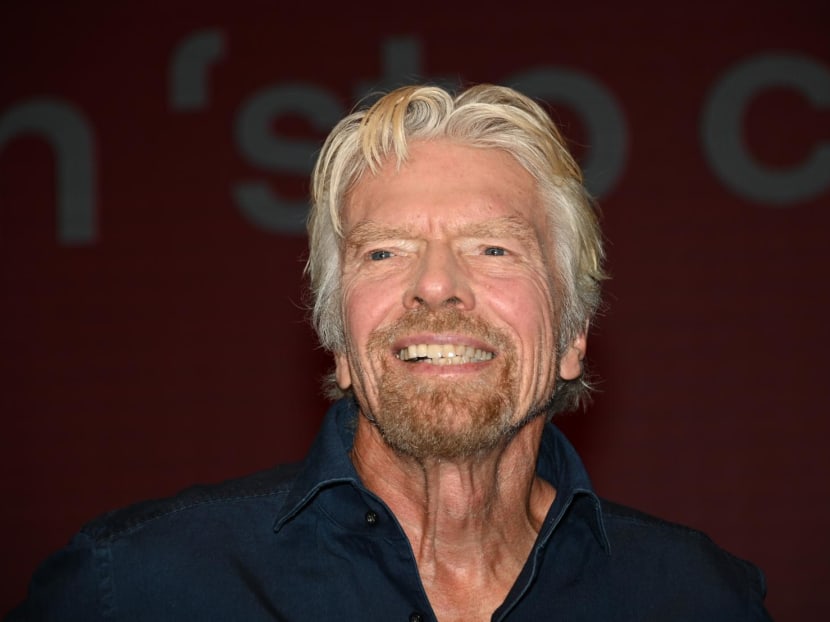Richard Branson declines live TV debate on death penalty, says 'brave thing' for Shanmugam to do is to engage S'porean activists
SINGAPORE — British billionaire Richard Branson has declined the Singapore Government's invitation for a live televised debate over its approach towards drugs and the death penalty, as he urged Home Affairs and Law Minister K Shanmugam to engage activists in the country instead.

- Mr Richard Branson has declined the Singapore Government's invitation for a live televised debate over its approach towards drugs and the death penalty
- The British billionaire said that a TV debate with Home Affairs and Law Minister K Shanmugam “cannot do the complexity of the death penalty any service”
- Doing so “reduces nuanced discourse to soundbites” and “turns serious debate into spectacle”, he added
- The Ministry of Home Affairs had on Oct 22 rebutted several statements made by Mr Branson regarding Singapore’s drug laws
SINGAPORE — British billionaire Richard Branson has declined the Singapore Government's invitation for a live televised debate over its approach towards drugs and the death penalty, as he urged Home Affairs and Law Minister K Shanmugam to engage activists in the country instead.
In a statement posted on his blog on Monday (Oct 31) and addressed to Mr Shanmugam, Mr Branson said that a TV debate “cannot do the complexity of the death penalty any service” because it “reduces nuanced discourse to soundbites” and “turns serious debate into spectacle”.
Mr Branson, founder of multinational conglomerate Virgin Group, added: "I can’t imagine that is what you are looking for. What Singapore really needs is a constructive, lasting dialogue involving multiple stakeholders, and a true commitment to transparency and evidence."
The Ministry of Home Affairs (MHA) had on Oct 22 rebutted several statements made by Mr Branson regarding Singapore’s drug laws.
It also invited him to Singapore — with his flight and accommodations fully paid for — to take part in a live televised debate with Mr Shanmugam.
Mr Branson had claimed in an earlier post that Nagaenthran K Dharmalingam, who was executed on April 27 for drug trafficking, had been hanged despite having a “well-documented intellectual disability”.
In his latest post, Mr Branson said that he felt "compelled to speak out when I see things go as horribly wrong as Singapore’s use of the death penalty" out of his "enormous respect for Singapore and Singaporeans and for everything your country has achieved over the last decades".
He said that there are many Singaporeans — including lawyers, human rights defenders, civil society organisations and others — who have consistently expressed the same concerns, and added that "this conversation needs local voices".
“In Singapore’s case, we have been inspired by several people and organisations — advocates, lawyers, journalists — with experience, knowledge and data," Mr Branson said.
"The brave thing for you would be to actively engage those Singaporean stakeholders, from Transformative Justice Collective to Mr M Ravi, Nagaenthran Dharmalingam’s courageous lawyer, and regional voices, such as the Anti-Death Penalty Asia Network, and treat them as equals who are just as interested in Singapore’s progress as I’m sure you are.
"They deserve to be listened to, not ignored, or worse yet, harassed.”
Mr Branson talked about how his grandfather, a barrister and then a High Court judge in the United Kingdom over a century ago, had told of his greatest regret in life in “donning the black cap and sentencing people to death”.
“He told my father he not only disagreed with the principle of the state killing people,” Mr Branson said. “He was also genuinely concerned that in the process, innocent people had been and would be executed. History has proven him right, time and again.”
The UK abolished the death penalty in 1969.
Mr Branson said that his grandfather "would have been overjoyed and pleased to know that abolition had no impact on crime rates in the UK one way or the other", adding that "there is no evidence that the death penalty reduces crime anywhere, not even in Singapore".
The British billionaire pointed to how Singapore is among a very small group of countries such as China, Iran, North Korea, Saudi Arabia, and parts of the United States that "continue to apply the death penalty at scale, and an even smaller group that imposes the death penalty for drug offences — against the expressed position of the United Nations".
But he also rebutted the notion that the abolition of the death penalty is a Western concept imposed on the rest of the world.
Instead, Mr Branson said that it is "about universal human rights and humanity’s shared aspiration to advance equality, justice, dignity, and freedom everywhere, for everyone”.
"If Singapore abolishes the death penalty, I’d be absolutely delighted and will celebrate with you... There is no evidence to support its continued existence. Just ask those in Singapore who know," he added.
TODAY has reached out to MHA for comment.








